Lewis Hamilton & Rosberg should race in Abu Dhabi - Coulthard
- Published
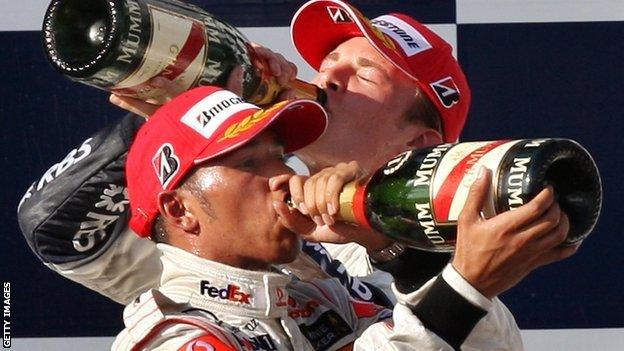
Lewis Hamilton and Nico Rosberg have been driving together in F1 since 2007
Mercedes have done an admirable job of handling Lewis Hamilton and Nico Rosberg as fairly as possible during the course of two occasionally fractious Formula 1 seasons.
They have done so by running race strategy in such a way that reduces the chances of intra-team friction while giving each driver as much of a chance as possible to win the race.
As a team, that is exactly the right thing to do - maximise the collective result while also allowing the drivers to race freely, within certain parameters set by the team.
However, for the outside world, it can often lead to grands prix like that in Brazil last Sunday, where the drivers' ability to race and take risks in an attempt to beat their rival is compromised by the team's requirement to stick to a pre-determined strategy.
With one race of the season to go, though, wouldn't it be cool if Mercedes - now they have nothing to lose and both championships are tied up - just let their drivers and their respective engineers off the leash and ran a gloves-off race in Abu Dhabi next weekend?
What would that mean?
Just for one race, Mercedes could try a different approach to increase the entertainment value of a season finale which otherwise could lack a bit of interest - if we're honest.
The drivers and their respective engineers could conduct strategy for themselves. Normal rules apply - they can't crash into each other - but Hamilton and Rosberg run their own races, without being restricted by the wider team's wish.
If it was going to work, the drivers would have to accept responsibility for what happens - whether it be losing the race to their team-mate or even letting Ferrari's Sebastian Vettel in.
Hamilton and Rosberg would have to accept that they would have the team to answer to if they embarrassed them. And they would have to be prepared to stand up afterwards and say: "We lost because of my choices, I accept that, it was a one-off just for the fans. The team would have won had we done it their way." And so on.
As long as that was understood, I can't see a reason not to let it happen.
Why can't this be done all the time?
It is important to understand why Mercedes have decided to run the two drivers' strategies in the way they do.
They have two drivers on equal-status contracts and they give preferential status to the car that is leading in a given race.
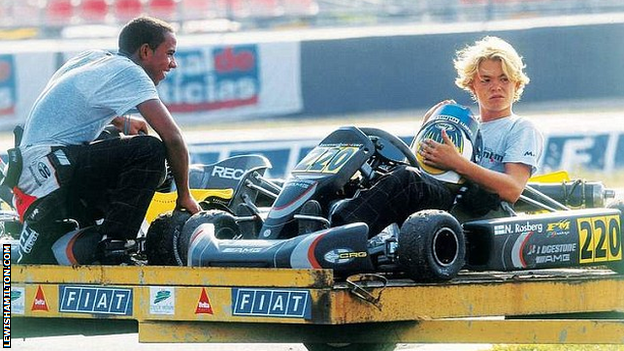
Hamilton and Rosberg have raced together since they were teenagers
There are a whole load of assumptions that mean the drivers cannot simply be left to their own devices throughout the season.
Firstly, there is no given that Hamilton and Rosberg will qualify at the front of the grid. Once they do, they might not get away from the start first and second - as happened in Hungary.
Beyond that, Mercedes might not have a big enough pace advantage in the race to allow them to just do what they want without risking a threat from another team.
The bottom line in all of this is that the team's primary aim is to win, and then to secure the best possible finish - a one-two - and which driver finishes ahead in that scenario is secondary.
The only time that is not the case is if they are in a championship battle with a driver from another team and they make a conscious decision that one driver has a much better chance of beating that rival and/or one of the Mercedes drivers falls out of contention.
More from F1 |
|---|
Drivers also benefit from Mercedes' approach
It is worth pointing out that Mercedes take the approach they normally do for the good of the drivers as well as the team.
The Mercedes engineers - like those of all the other teams - have computers that run thousands of simulations of possible strategies before a race.
Out of those calculations come one or two ideal strategies, and the team will choose the most advantageous one, while keeping flexibility to modify it in the event of changing circumstances in the race.
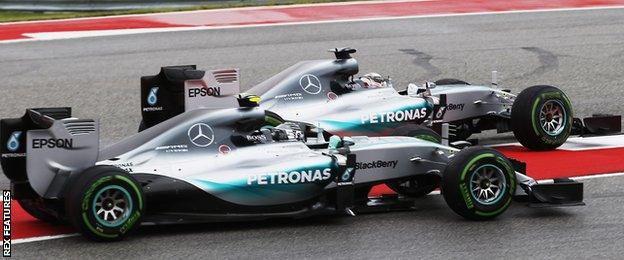
Rosberg was unhappy with Hamilton's overtake at the first corner of the United States GP, where the Briton sealed his third world title
So it is not as easy as one driver - Hamilton, in the case of Brazil - asking to change strategy because he feels he is faster but cannot pass his team-mate while running close behind.
And Brazil was a good example of why Mercedes cannot let their drivers and engineers concentrate only on each other - because Vettel was close enough behind they had to focus on making sure they beat him as well.
Where drivers' strategies can sometimes differ
Occasionally, if the circumstances of a race make it feasible, Mercedes have taken the approach of one of their drivers being on an alternate strategy from the other.
Take their famous battle in Bahrain in 2014, for example.
In that race, the fastest strategy was to run the softer tyre for the first two stints before switching to the harder tyre for the last stint. As the lead car, Hamilton had that strategy.
Rosberg, behind him, felt he was quicker, so was allowed to invert his strategy, going for the harder tyre in the middle stint, which would lose him time, but being given the softer tyre for the end of the race to give him a chance to come back at his team-mate.
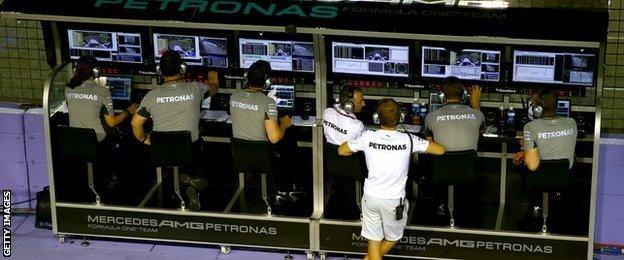
The Mercedes' pit wall dictates the strategy for the race for both drivers
As he was the faster driver on the day, Rosberg used this strategy to his advantage, made sure he did not lose too much time in the middle stint, and challenged Hamilton hard at the end.
It led to a thrilling finish, but Hamilton just held on.
But this option is not always available - it depends on the tyre behaviour on a given weekend - in which case the drivers just have to make the best of what they have got.
The usual way to beat someone
In normal circumstances, the key strategy tool is the so-called 'undercut'.
This is where the driver behind stops before the car he is chasing and uses the speed advantage of new tyres on his first lap out of the pits to make up enough time so that when the car that had been leading comes out of the pits, the car that had been behind is now ahead.
When drivers from rival teams are racing each other, this tactic is used all the time. The problem with it is that making an earlier stop has a knock-on effect - there is a greater risk of running out of tyres before the end of the race and losing the position again. So it's a fine balancing act.
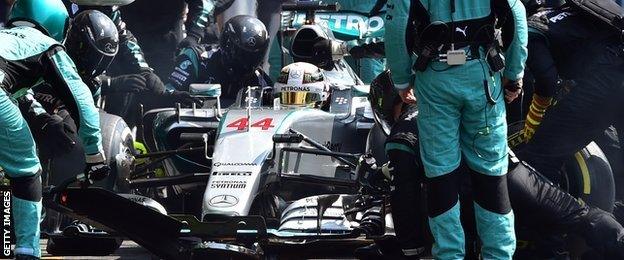
Mercedes' do not allow 'undercutting' their own drivers, a tactic often used by rival teams in the race
At Mercedes the drivers are prevented from using the undercut against each other. The lead car gets first call on strategy and his engineer can choose to stop at the most advantageous time. The car behind has no choice but to wait.
The only time this would not be the case would be if the car behind was under threat from a rival behind him - in which case he would be given pit-stop priority, but the stops would be orchestrated in such a way as not to disadvantage the leader.
As a team with two drivers racing each other, there is simply no other way to operate, otherwise the risk is the two engineers try to outdo each other with the undercut, and both drivers end up vulnerable at the end of the race.
And the minute you start giving advantage to the second car when you have two number-one drivers, it's all over. The team implodes - as happened with Sebastian Vettel and Mark Webber at Red Bull.
Something funky for end of season
But, on a one-off basis, with nothing of huge importance hanging on the Abu Dhabi race, why not free that up? If the guy behind wants to undercut, then he can.
They could just run the grand prix as if Hamilton and Rosberg were racing for different teams.
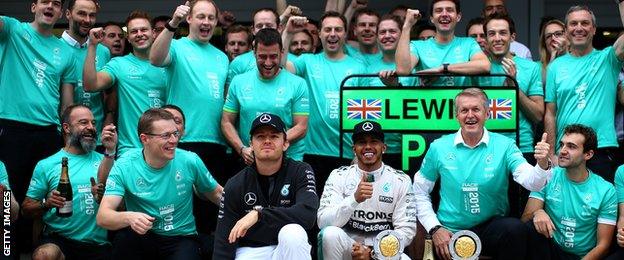
Mercedes celebrate winning their second consecutive constructors' title after the Russian Grand Prix
To make this work, there would have to be a Chinese wall between Hamilton's engineer Peter Bonnington and Rosberg's Tony Ross. And strategy chief James Vowles would have to stay out of it.
But I don't see a reason why, now Mercedes have secured first and second in the drivers' championship and the team have won the constructors' title, they can't let Hamilton and Rosberg run free and race as individuals just this once.
David Coulthard was talking to BBC Sport's Andrew Benson
- Published15 November 2015
- Published15 November 2015
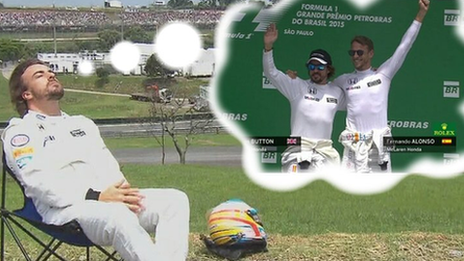
- Published15 November 2015
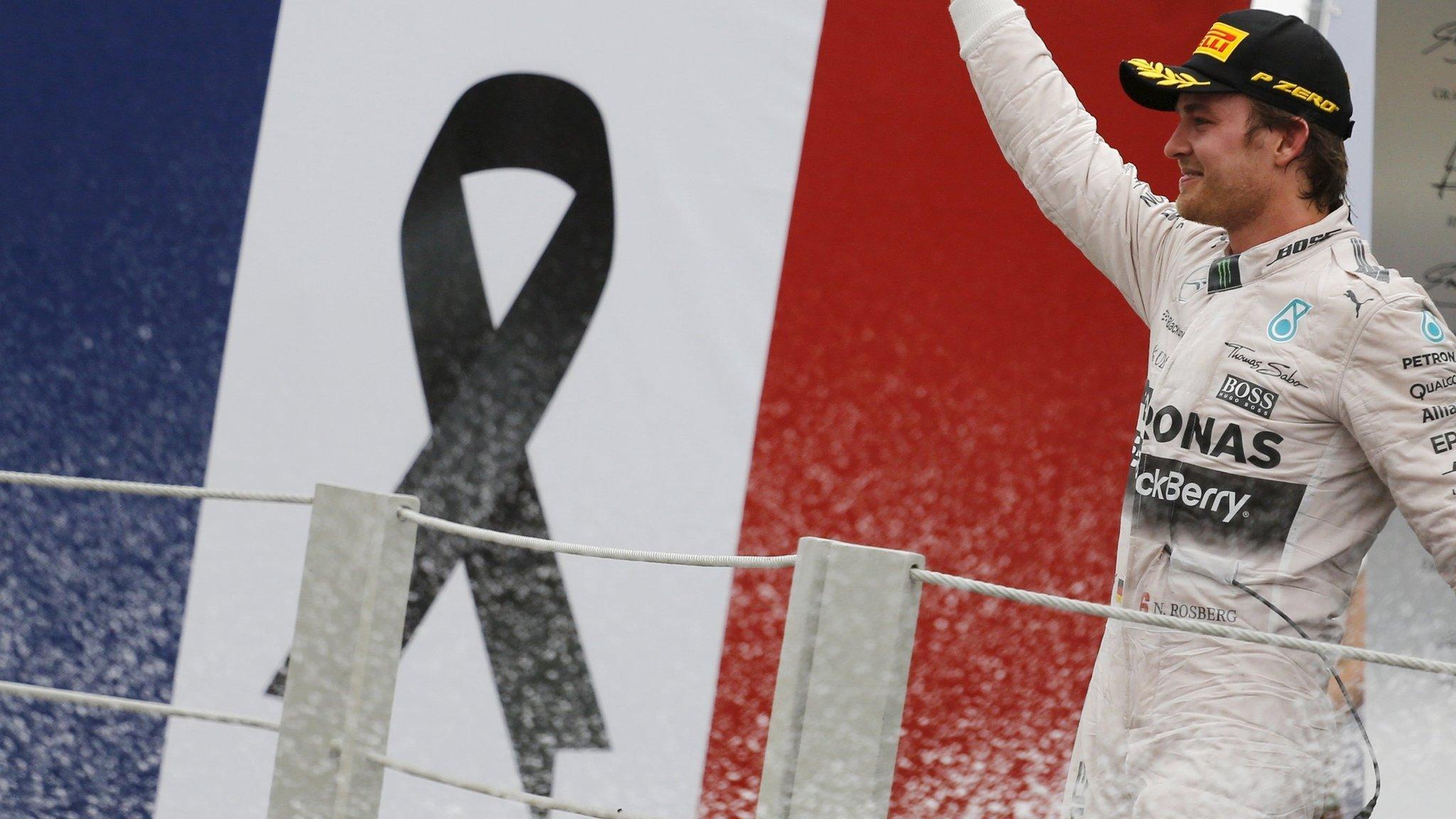
- Published12 November 2015

- Published9 November 2015
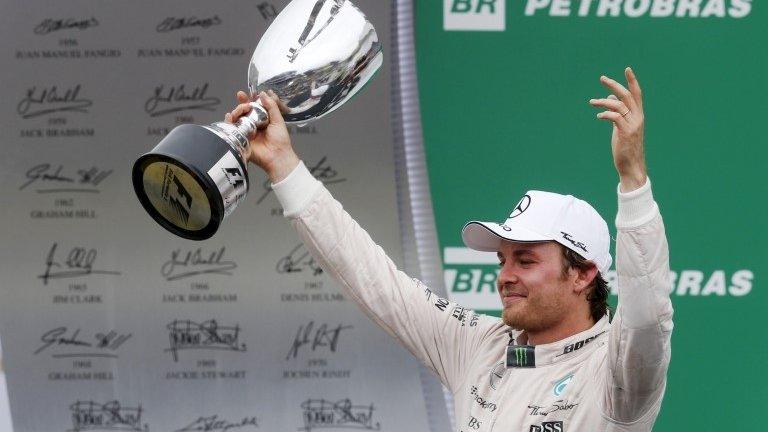
- Published14 November 2015
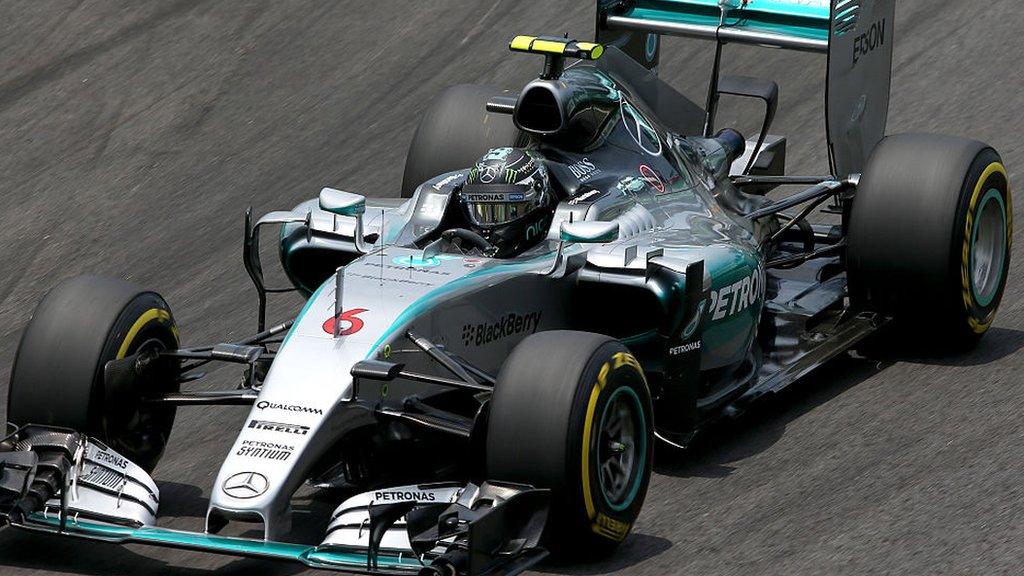
- Published9 November 2015
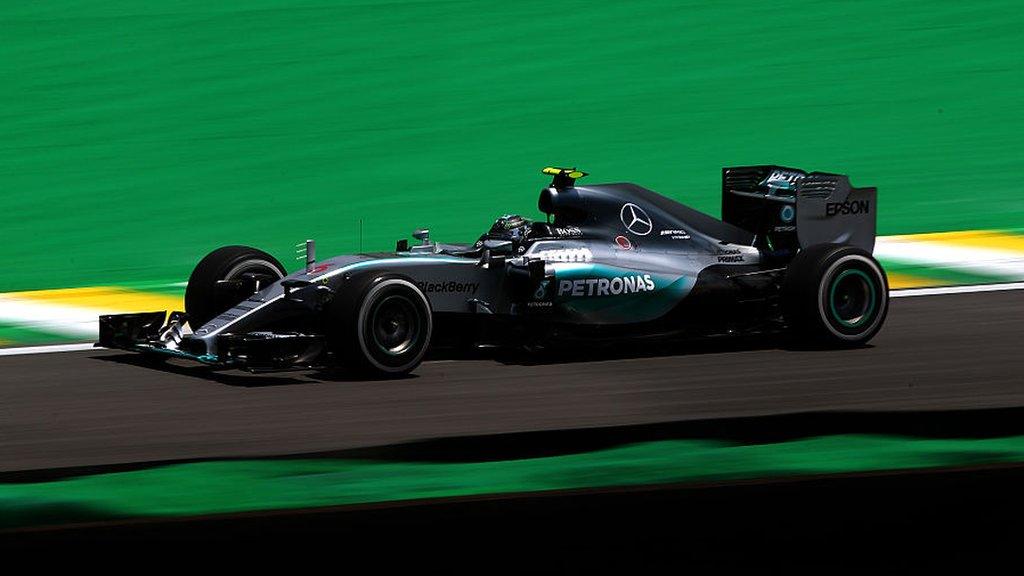
- Published12 November 2015
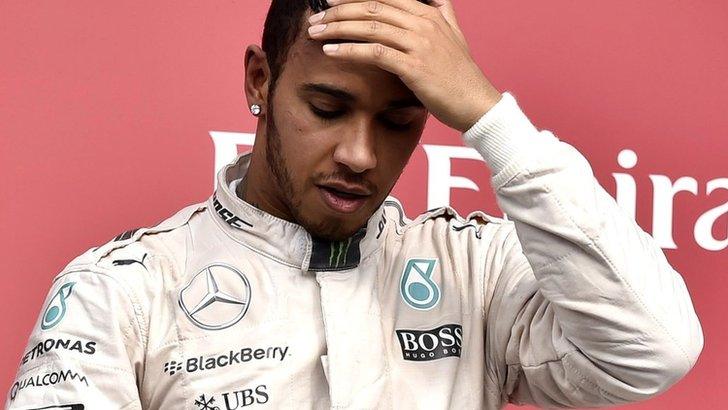
- Published18 December 2015

- Published2 November 2018

- Published26 February 2019
